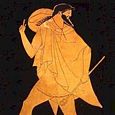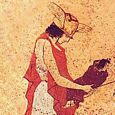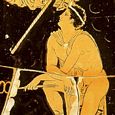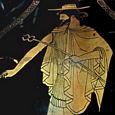



























































































 |
.
HERMES GOD ΕΡΜΗΣ
GENERAL
INFO
I)
What was Hermes the god of?
|
GOD OF HERALDRY
|
Patron of: Heralds;
Messengers
Favour: Protection of heralds; Eloquent speech
|
|
GOD OF OMENS
(MESSAGES FROM THE GODS)
|
Patron of: Messages from the
gods; Birds of omen; Prophetic dreams;
Divination by pebbles
Favour: True omens
Curse: False or deceptive omens
|
|
GOD OF ANIMAL HUSBANDRY
|
Patron of: Cattle-herders;
Shepherds; Goatherds; Horse & mule breeders;
Grazing pastures; Cave shelters; Guard-dogs;
Animal predators
Favour: Herds multiply (fertility); Herds
protected (from predators)
Curse: Herds die off (disease, infertility);
Herds lost (to predators)
|
|
GOD OF RUSTIC POETRY &
ANIMAL FABLES
|
Patron of: Bucolic poetry
& music; Animal fables (eg the tales of Aesop)
Favour: Poetic inspiration
|
|
GOD OF TRADE
|
Patron of: Markets;
Merchants; Trade; Commerce
Favour: Success in trade; Goods protected (from
thieves);
Persuasive speech
Curse: Unsuccessful trade
|
|
GOD OF TRAVEL
|
Patron of: Roads;
Travellers; Laws of hospitality; Protector of
guests
Favour: Safe travel; Protection of guests
|
|
GOD OF THE HOME
|
Patron of: the Home; Guard-dogs
Favour: Homes protected (from thieves &
criminals)
|
|
GOD OF THIEVERY
|
Patron of: Thieves; Cattle-rustlers;
Bandits; Crafty thoughts
Favour: Wiliness; Stealth
|
|
GOD OF LUCK
|
Patron of: Luck; Gamblers;
Merchants
|
|
GOD OF LANGUAGE
& EDUCATION
|
Patron of:
Writing; Learning; Memory; Eloquence; Oratory; Astronomy
Favour: Persuasive speech; Learning
|
|
GOD OF ATHLETICS
|
Patron of: Gymansiums;
Athletic contests; Athletes
Favour: Athletic success
|
|
GUIDE OF THE DEAD
|
Patron of:
Passage of souls to
the underworld;
Visitations of the dead in dreams (bearing messages to
loved ones)
|
II)
What were his symbols, attributes,
sacred plants and animals?
|
SYMBOLS
|
Herald's staff or caduceus (Greek
"kerykeion")
|
|
ATTRIBUTES
|
Herald's staff; Winged
sandals; Travellers' cap (sometimes winged); Ram
|
|
CHARIOT
|
None, he flew on winged
sandals
|
|
SACRED PLANTS
/ FLOWERS
|
Crocus (Greek "krokos");
Greek Strawberry-Tree (Greek "andrakhnos")
|
|
SACRED ANIMALS
|
Tortoise (Greek "khelone");
Ram (Greek "krios")
|
|
SACRED BIRDS
|
Hawk (Greek "hierax")
|
|
SACRED OBJECTS
|
Hermai (stones that marked
roads and boundaries - often adorned with the
carved head of Hermes and a fertility phallus)
|
|
PLANET OF HERMES
|
Mercury (named after
Mercurius, the Roman god of trade identified with
Hermes). The Greeks themselves called the planet
"Aster Hermou" (Star of Hermes).
|
|
DAY OF HERMES
|
Wednesday (named after the
Germanic god Woden, who was identified with
Mercurius, the Roman Hermes). The Greeks called
the day "Hemera Hermou" (Day of Hermes).
|
III)
Who were the family & attendants of Hermes?
|
FATHER
|
ZEUS King of the Gods, son
of the Titanes Kronos and Rhea
|
|
MOTHER
|
MAIA Mountain Nymphe,
daughter of the Titanes Atlas and Pleione
|
|
WIFE
|
Unmarried (or, according to
some, PEITHO the Goddess of Persuasion)
|
|
DIVINE CHILDREN
|
PAN God of Goat-herds and
hunting
HERMAPHRODITOS Daimon half-male, half-female
|
|
HERO CHILDREN
|
AUTOLYKOS Thief who could
change the shape of objects with a touch
AETHALIDES Argonaut hero who had an unfailing
memory
|
|
ATTENDANTS & MINIONS
|
PAN God of Goat-herds
OREIADES Nymphai of the Mountains
PANES & SATYROI Daimones (Spirits) of the
Mountains
|
IV)
Where and how was he worshipped?
|
PATRON OF REGION
|
Arkadia in Greece
|
|
HOLIEST SHRINE
|
Mt Kyllene in Arkadia (his
birth-place)
|
|
OTHER SHRINES
|
Temples; Cavern-shrines;
Altars in market-places, gymnasiums, athletic
arenas,
house entrances
|
|
ASPECTS OF HERMES
|
1) Titan Krios (the Ram);
Titan Atlas (the Daring One); Pleione (Breeder of
Many);
Maia (Nursing Mother); Aigipan (Goat Herder)
2) Thanatos (gentle Death); Hypnos (Sleep); Oineros (Dream)
|
|
IDENTIFIED WITH
NON-GREEK GODS
|
Mercurius (Roman god); Thoth
(Egyptian god); Anubis (Egyptian god);
Woden-Odin (Germanic god)
|
V)
What were some of the popular myths about Hermes?
|
SAGA OF THE GODS
|
* The newly-born Hermes
stole the cattle of Apollon but, upon being
discovered, made a fair trade with the god.
* Hermes rescued Zeus' love Io from the hundred-eyed
giant Argos-Panoptes.
* Hermes stole back the sinews of Zeus from the
monster Typhoeus who had overcome the king of the
gods in battle.
* He assisted in the creation of Pandora, the
first woman, and delivered her to Epimetheus.
|
|
LOVE STORIES
|
* Hermes seduced the
Arkadian girl Penelope disguised as a shepherd.
* He seduced the Athenian princess Herse and
turned her obstructive sister Agraulos into a
stone.
* Hermes pursued and raped the Kretan princess
Apemosyne on the island of Rhodes.
|
|
FAVOUR & BLESSINGS
|
* He helped Perseus in his
quest to slay the monster Medousa.
* He guided Herakles to the underworld in his
mission to fetch the Kerberos.
* He assisted Odysseus in his encounter with the
witch Kirke.
|
|
WRATH & PUNISHMENT
|
* He transformed the tell-tale
Battos into a stone for telling Apollon that he
was the one who had stolen the god's cattle.
* He transformed the nymphe Khelone into a
tortoise as punishment for ignoring his calls to
attend the wedding of Zeus and Hera.
* He metamorphosed the tell-tale Hierax into a
hawk as punishment for telling the Gigante Argos
that he had come to steal his ward Io.
* He turned the Athenian princess Agraulos into a
stone when she tried to stop him from visiting
her sister Herse.
|
PICTURES
I)
Depictions of Hermes in Greek Vase Painting
These
images of Hermes come from Ancient Greek Vases,
painted approximately
2,500 years ago. NB Click on thumbnails to view full-size
images.
II)
Other Classical Depictions of Hermes
Hermes
was also depicted in classical statues, "hermae",
stone reliefs, frescoes and coins.
SELECTED
MYTHS (short versions)
I)
Baby Hermes & the Theft of Apollon's cattle
"Maia, after her
intercourse with Zeus, bore Hermes in a cave on
Kyllene. Though he was laid out in swaddling-clothes
with her winnowing-basket for a cradle, he escaped
and made his way to Pieria, where he stole some
cattle that Apollon was tending. To keep from being
discovered by the tracks, he put boots on their feet
and led them to Pylos. He hid them in a grotto,
except for two which he sacrificed, pinning up their
hides on rocks, boiling some of the meat for his meal
and burning the rest. Outside the cave he found a
tortoise feeding. He cleaned it out, and stretched
across the shell strings made from the cattle he had
sacrificed, and when he had thus devised a lyre he
also invented a plectrum. Meanwhile Apollon reached
Pylos in his search for the cattle, and asked the
locals about them. They told him that they had indeed
seen a boy driving some cattle, but they could not
say where they had been driven because there were no
tracks to be found. So Apollon learned who the thief
was by divine science, and made his way to Maia on
Kyllene to charge Hermes. Maia, however, showed
Apollon the baby in his swaddling-clothes, whereupon
Apollon took him to Zeus and demanded his cattle.
When Zeus told Hermes to return them, he denied
everything, but since his father would not believe
him, he led Apollon to Pylos and gave him back his
cattle. Then, when Apollon heard the lyre, he
exchanged the cattle for that. And as Hermes was
tending the cattle, this time he fashioned a shepherd’s
pipe which he proceeded to play. Covetous also of
this, Apollon offered him the golden staff which he
held when he herded cattle. But Hermes wanted both
the staff and proficiency in the art of prophecy in
return for the pipe. So he was taught how to prophesy
by means of pebbles, and gave Apollon the pipe. And
Zeus made Hermes his personal herald and messenger of
the gods beneath the earth." Source:
Apollodorus , The Library 3.112-115
II)
Hermes & the tell-tale Battos
"[Hermes stole the
cattle of Apollon and brought them] past Mainalos [in
Arkadia] and what are called the watch-posts of
Battos. Now this Battos used to live on the top of
the rock and when he heard the voice of the heifers
as they were being driven past, he came out from his
own place, and knew that the cattle were stolen. So
he asked for a reward to tell no one about them.
Hermes promised to give it him on these terms, and
Battos swore to say nothing to anyone about the
cattle. But when Hermes had hidden them in the cliff
by Koryphasion, and had driven them into a cave
facing towards Italia and Sikelia, he changed himself
and came again to Battos and tried whether he would
be true to him as he had vowed. So, offering him a
robe as a reward, he asked of him whether he had
noticed stolen cattle being driven past. And Battos
took the robe and told him about the cattle. But
Hermes was angry because he was double-tongued, and
struck him with his staff and changed him into a rock.
And either frost or heat never leaves him." Source:
Antoninus Liberalis, Metamorphoses 23
III)
Hermes & the hundred-eyed giant Argos-Panoptes
"Zeus seduced Io while
she was a priestess of Hera. When Hera discovered
them, Zeus touched the girl, changed her into a white
cow, and swore that he hand not had sex with her ...
Hera demanded the cow from Zeus, and assigned Argos
Panoptes as its guard ...Argos tied the cow to an
olive tree in the grove of the Mykenaians. Zeus
instructed Hermes to steal her, and Hermes, unable to
sneak her out because Hierax had told on him, killed
Argos with a stone. From this came Hermes’
surname Argeiphontes." Source: Apollodorus,
The Library 2.4
IV)
Hermes & the lazy Nymphe Khelone
"For his
wedding with Juno [Hera], Jupiter [Zeus] ordered
Mercurius [Hermes] to invite all the gods, the men
and the animals to the wedding. Everyone invited by
Mercurius [Hermes] came, except for Chelone who did
not deign to be there, mocking the wedding. When
Mercurius noticed her absence, he went back down to
the earth, threw in the river the house of Chelone
that was standing over the river and changed Chelone
in an animal that would bear her name [chelone is
Greek for tortoise]." Source: Servius, On
Virgil's Aeneid 1.505
V)
Hermes, Odysseus & the witch Kirke
"I [Odysseus] left the ship and shore
and took the path upward; but as I traversed those
haunted glades, as I came close to Kirke’s house
and neared the palace of the enchantress, I was met
by golden-wanded Hermes; he seemed a youth in the
lovely spring of life, with the first down upon his
lip. He seized my hand and spoke thus to me: ‘Luckless
man, why are you walking thus alone over these hills,
in country you do not know? Your comrades are yonder
in Kirke’s grounds; they are turned to swine,
lodged and safely penned in the sites. Is your errand
her to rescue them? I warn you, you will never return
yourself, you will only be left with the others there.
Yet no - I am ready to save you from all hazards,
ready to keep you unscathed. Look. Here is a herb of
magic virtue; take it and enter Kirke’s house
with it; then the day of evil never will touch your
head. I will tell you of all her witch’s arts.
She will brew a potion for you, but with good things
she will mingle drugs as well. Yet even so, she will
not be able to enchant you; my gift of the magic herb
will thwart her. I will tell you the rest, point by
point. When Kirke strikes you with the long wand she
has, draw the keen sword from beside your thigh, rush
upon her and make as if to kill her. She will shrink,
back, and then ask you to lie with her. At this you
must let her have her way; she is a goddess; accept
her bed, so that she may release your comrades and
make you her cherished guest. But first, make her
swear the great oath of the Blessed Ones [by the
river Styx] to plot no mischief to you thenceforward
- if not, while you lie naked there, she may rob you
of courage and of manhood.’
So spoke the Radiant One; then gave the magic herb,
pulling it from the ground and showing me in what
form it grew; its root was black, its flower milk-white.
Its name among the gods is moly. For mortal men it is
perilous to pluck it up, but for the gods all things
are possible.
Then Hermes departed over the wooded island went his
way to the mountain of Olympos." Source:
Homer, Odyssey 10.135
FURTHER
INFO (12 detailed pages on Hermes)
PART 1: INDEX &
ILLUSTRATIONS
Index of Hermes pages
Illustrations from Greek Vase Paintings
Quotes - Descriptions, Hymns
PART 2: HERMES GOD OF
Quotes - describing his various divine
functions
PART 3A: MYTHS
GENERAL 1
Quotes - general stories about Hermes
PART 3B: MYTHS
GENERAL 2
Quotes - general stories about Hermes continued
PART 3C: MYTHS
GENERAL 3
Quotes - stories about Hermes as minister and
herald of Zeus
PART 4: MYTHS
WRATH
List of
those Punished
Quotes - stories of those punished by the god
PART 5: MYTHS
FAVOUR
List of those Favoured
Quotes - stories of heroes blessed or assisted by
the god
PART 6A: MYTHS
LOVES
List of
Lovers
Quotes - stories of the women loved by Hermes
PART 6B: MYTHS CHILDREN
List of Children
Quotes - children of Hermes
PART 7:
ESTATE & ATTENDANTS
Lists of
divine Possessions and Attendants
Quotes - items owned by the god; sacred plants
and animals
Quotes - attendants of the god
PART 8: CULT OF
HERMES
Quotes - cult of the god organised by region
PART 9: TITLES & EPITHETS
List of Cult Titles and
Poetic Epithets
PAGE BORDER:
Derived from on an ancient Greek vase painting
|





























































































|



